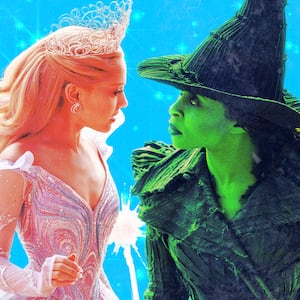The ghosts of the past loom large in The Great Escaper, and not only because its plot concerns an elderly man grappling with his traumatic wartime experiences.
Oliver Parker’s feature is the final film of legendary Oscar-winner Glenda Jackson—who died nine months after its production’s conclusion at the age of 87—and was, at the time of its 2023 theatrical release in the United Kingdom, announced as the swan song of Michael Caine, who’s only recently said that he’s coming out of retirement to join Vin Diesel in The Last Witch Hunter 2.
Fiction and reality blend seamlessly in this true-life tale of a veteran making a most unlikely pilgrimage. If its melodrama is unabashedly manipulative, it’s not altogether ineffective at eliciting waterworks.
Debuting in the U.S. as part of PBS’s Masterpiece series, The Great Escaper (November 23)—the second film to tell its story, following 2023’s Pierce Brosnan-led The Last Rifleman—is about Bernard Jordan (Caine), a 90-year-old who resides in a retirement home with his wife Rene (Jackson).

It’s been seven decades since Bernard first wooed Rene at a dance and captured her heart watching the sun rise over a lush valley during “holy hour,” and it’s been just as long since Bernard left for WWII as a member of the Royal Navy. Now, he dotes on his spouse when not taking walks in and around his residence, and Parker fixates on his feet and hands—as he steps cautiously over doorway thresholds and grabs onto wall railings for support—to underscore that, though he can still move about on his own, doing so requires considerable effort.
Bernard, who’s made a mess of their apartment by rummaging through old boxes of photographs and artifacts, is as concerned with yesterday as today, and that’s particularly true concerning a 70th anniversary D-Day event that he’s missed out on attending due to a lack of space on an organized trip.
Nonetheless, despite this unfortunate situation and the fact that Rene’s health has been better, he opts—with his wife’s subtle blessing—to embark on an “adventure.” Sneaking past staffers, he makes his way to the street. At the bus stop, he unexpectedly runs into nurse Adele (Danielle Vitalis), who’s puzzled to see Bernard taking his daily walk so early in the morning. Fortunately, her suspicion doesn’t compel her to stop him from going along his merry way, and before you know it, Bernard is on a ferry bound for France.
With slumped shoulders and a pained countenance, Caine’s Bernard is a morose loner on a mission whose importance remains, at least at the outset, something of a mystery.

Having a drink by himself, he’s joined and quickly befriended by Arthur Howard-Johnson (John Standing), a former RAF pilot. When Arthur learns that Bernard is traveling alone, he invites him to tag along with his group and to share his hotel room in Normandy. This is a stroke of good luck for Bernard, although Caine’s performance has a gentleness that borders on the one-note; while his eyes are alight with life, his melancholy is difficult to precisely read, especially in terms of his feelings toward Arthur and the others he meets, such as young veteran Scott Selwood (Victor Oshin), who lost his legs in battle.
Caine is meant to be the more able-bodied of the pair but it’s Jackson who delivers the livelier performance in The Great Escaper, disobeying doctor’s orders by dancing around her bedroom to the song that played when she and Bernard first fell in love, and grousing about the press attention that soon engulfs her. That coverage is the byproduct of the fact that, upon noticing that Bernard has gone missing, the retirement home’s staff alerts the police, and when they hear about the purpose of Bernard’s outing, they send out a tweet calling him “the great escaper,” thereby transforming him into a media darling.

In the aftermath of this breaking news, manager Judith (Jackie Clune) proves frustrated by Bernard’s escapades, and Adele worries about how his wife will handle being alone. Jackson’s Rene, however, remains loyal to her husband throughout, recognizing that his quest is a natural byproduct of the same sorts of feelings—loss, grief, guilt, and regret—that invariably color one’s final days.
In The Great Escaper, Bernard figuratively re-storms Normandy beach in order to confront his demons, along the way providing comfort to Arthur, who believes that he may have inadvertently killed a loved one on D-Day and is now plagued by alcoholism. William Ivory’s script does its best to interject moments of humor into its downbeat action, whether it’s Rene criticizing Adele’s forearm tattoos or Arthur finishing a day’s worth of boozing with comrades by unceremoniously puking on the side of the road.
Still, there’s not much to laugh about when it comes to Bernard, whose journey is pockmarked with bouts of PTSD that take him back to his D-Day landing alongside a comrade, Douglas Bennett (Elliott Norman), who forced him to promise to deliver a letter to his girlfriend should he not make it back alive.

The Great Escaper is bathed in Craig Armstrong’s syrupy score, its flashbacks have a soft, grainy warmth that’s meant to pull at the nostalgic heartstrings, and its climactic revelations have been designed for maximum weepiness. There’s a calculating quality to the material that’s hard to ignore.
Even so, Caine and Jackson lend it much-needed soulfulness and authenticity. There’s no way to wholly separate Bernard and Rene’s sadness at facing their mortality from the headliners’ end-of-their-career stations, and the film hits a bittersweet nerve in its portrait of its characters’ (and actors’) struggle to make peace with their failings, and to hold onto their joy, in their twilight years.
Blending its real and make-believe elements in a pleasantly mawkish way, The Great Escaper is a button-pusher that’s just skillful enough to get by on the charm of its stars.While Caine may be planning to return to the big screen, Parker’s feel-good film plays as a fitting farewell for both him and his dearly departed leading lady.








